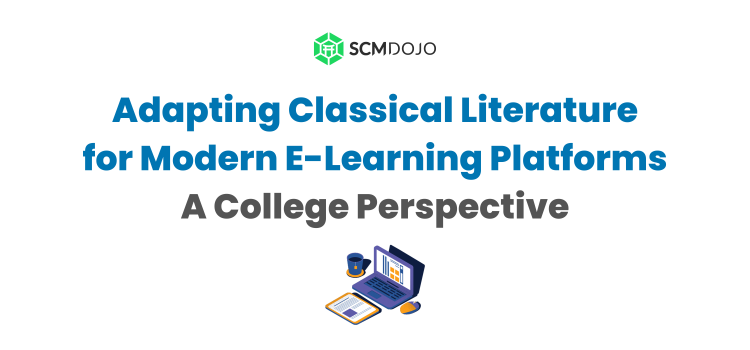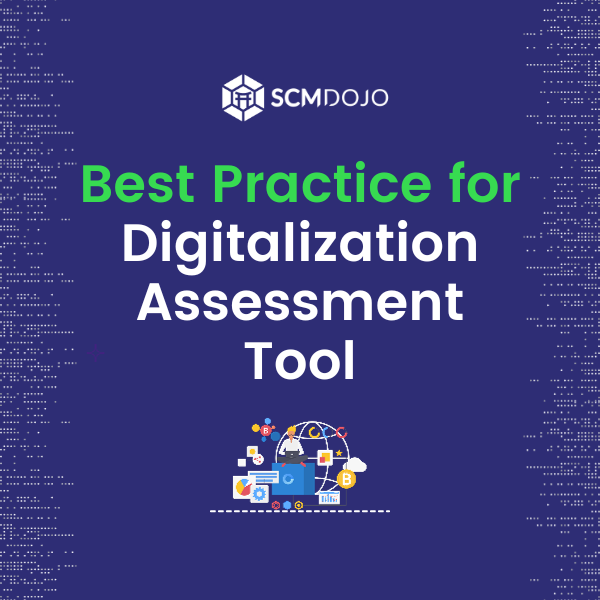In the realm of college education, classical literature has always held a prestigious position. The study of timeless works by authors like Shakespeare, Jane Austen, and Homer provides students with insights into the human condition and the historical contexts that shaped these narratives. However, as digital technology reshapes the educational landscape, the way students interact with these classical texts is also evolving with fast paced adoption of Modern E-Learning Platforms such as SCMDOJO Academy.
Traditional methods of studying literature often involved students poring over physical texts, engaging in classroom discussions, and writing extensive analyses. However, with the advent of modern e-learning platforms, there’s a shift in how these literary works are approached. These platforms offer dynamic, interactive ways to engage with classical literature, making it more accessible and appealing to the digital generation. DoMyEssay, a top “write my literature review,” has observed a surge in students seeking help with literature essays, indicating a growing interest in these subjects.
Adapting Classical Texts for Digital Learning
Enhanced Reading Experience
E-learning platforms are redefining the way classical texts are read and experienced. By incorporating audio and visual elements, these platforms make the texts more engaging and accessible. For instance, Shakespeare’s plays, known for their complex language and historical references, are now more approachable through interactive tools that provide historical context, character maps, and dramatized readings. These tools help demystify the Shakespearean language and enhance comprehension.
Furthermore, augmented reality (AR) features in e-learning platforms can bring scenes from classic novels like “Pride and Prejudice” to life. This technology allows students to visualize the settings and characters in a novel, providing a more immersive experience that surpasses traditional reading. Imagine walking through the halls of Pemberley or attending a ball in Netherfield Park, all through the screen of a tablet or smartphone.
Interactive Analysis and Discussions
E-learning platforms have revolutionized literary analysis and discussions. Discussion forums and chat rooms enable students to participate in lively debates and analyses of literary themes, characters, and narratives. This interactive environment fosters a deeper understanding and appreciation of classical texts, as students can share and contrast their interpretations with peers from diverse backgrounds.
Digital annotations and shared notes further enhance this collaborative learning experience. Students can annotate texts online, share their insights, and gain new perspectives from classmates. This collaborative approach to studying literature not only makes the learning process more engaging but also more comprehensive, as it allows for a multitude of interpretations and viewpoints to be considered.
Personalized Learning Paths
Incorporating adaptive learning technology into e-learning platforms offers a tailored educational experience for students engaging with classical texts. This technology uses algorithms to adjust the difficulty level and the presentation of content based on individual student performance and preferences.
For example, a student struggling with the complex themes in Homer’s “Odyssey” might receive additional resources like simplified summaries or guided questions, while a more advanced student could be presented with in-depth analysis and critical essays. This personalized approach ensures that each student can navigate through the material at their own pace and level of understanding, making the study of classical literature more accessible and effective for a diverse range of learners.
Incorporating Multimedia in Literary Studies
Multimedia Content as a Learning Aid
The inclusion of multimedia content such as video lectures, podcasts, and interviews with literature experts on e-learning platforms has been a game-changer. This content helps break down complex literary themes and historical contexts, making them more digestible for students. For example, a video lecture could provide an in-depth analysis of a particular character or theme, supplemented by visual aids and examples.
Virtual field trips are another exciting feature of modern e-learning platforms. Students can embark on virtual tours of historical sites related to the literature being studied, like Dickens’s London or the Paris of Victor Hugo. These experiences enrich students’ understanding of the setting and time period, providing context that can be difficult to convey through text alone.
Creative Assignments and Projects
Encouraging creativity, students are often tasked with creating multimedia projects like digital storytelling or video essays. These assignments allow students to express their understanding of the literature in a creative manner, which can be particularly engaging for those who might find traditional essay writing challenging. This approach also helps develop important digital literacy skills, preparing students for a world where digital communication is increasingly prevalent.
Interactive Quizzes and Gamification
E-learning platforms are increasingly incorporating interactive quizzes and gamification elements into the study of literature. These quizzes can be designed to test students’ comprehension of themes, characters, and plots in an engaging and interactive way.
For instance, after studying a novel like Jane Austen’s “Emma,” students might take a quiz where they match quotes to characters or sequence events in the story. Gamification elements like earning points, badges, or unlocking new levels of complexity can motivate students and make the learning process more enjoyable. This interactive approach not only reinforces students’ understanding of the material but also makes the learning experience more dynamic and enjoyable, catering to different learning styles and preferences.
Audiobooks and Dramatizations
Audiobooks and dramatizations of literary works have become an invaluable component in e-learning for literature studies. They offer a unique way to experience the text, especially for auditory learners. Hearing the dialogue and descriptions in novels, plays, or poetry read aloud by professional voice actors can bring a new dimension to the text, making it more relatable and engaging.
For instance, listening to a dramatized version of Homer’s “Iliad” can help students better grasp the epic’s emotional depth and poetic rhythm. This method can be particularly effective in conveying the tone and atmosphere of a work, aiding in deeper comprehension and appreciation of the literature.
Integration of Social Media Elements
The integration of social media elements into literary studies through e-learning platforms presents another innovative approach. Features like book-themed forums, hashtag discussions on platforms like Twitter, or even Instagram posts about specific literary works encourage students to engage with literature in a medium they are familiar and comfortable with.
For example, a class studying F. Scott Fitzgerald’s “The Great Gatsby” might use a specific hashtag to share insights, discuss themes, or post creative interpretations of the text. This modern approach not only makes the study of literature more accessible and relatable to the digital generation but also fosters a sense of community and shared learning among students.
The Role of Technology in Personalizing Literary Education
Adaptive Learning Pathways
One of the key strengths of modern e-learning platforms is their ability to adapt to individual learning styles and paces. For instance, a student who finds the Middle English language of Chaucer’s “Canterbury Tales” challenging might receive additional resources, such as simplified translations or annotated versions, to aid their understanding. This personalization ensures that students are not left behind due to language barriers.
Quizzes and interactive tests on these platforms provide immediate feedback, a crucial aspect of the learning process. This instant feedback helps students understand where they need to focus their study efforts, allowing for a more targeted and effective learning experience.
Access to a Wide Range of Resources
The wealth of resources available online significantly broadens the scope of research and study for students. Online libraries and databases grant access to critical essays, historical documents, and related literature. This extensive range of resources is particularly valuable for students working on assignments and essays, as it allows them to conduct thorough research and develop well-rounded arguments and analyses.
Integration of Artificial Intelligence (AI) Tools
The integration of Artificial Intelligence in e-learning platforms marks a significant advancement in literary education. AI tools can analyze students’ responses and essays, providing tailored suggestions for improvement and areas to focus on.
For example, an AI can evaluate a student’s essay on Shakespeare’s “Hamlet,” offering insights into their interpretation of the text, suggestions for deeper analysis, and even grammar and style corrections. This technology not only aids in the improvement of writing skills but also encourages a deeper engagement with the text, fostering critical thinking and analytical skills.
Collaborative Modern E-Learning Platforms Environments
Technology has also enabled the creation of virtual collaborative learning environments. These platforms allow students to engage in group discussions, peer reviews, and collaborative writing projects, regardless of their geographical location.
For example, students studying “The Great Gatsby” could participate in a global forum, sharing perspectives with peers from different cultural backgrounds. This exchange enriches the learning experience, as students are exposed to a diverse range of interpretations and viewpoints. Additionally, collaborative projects, such as jointly written essays or group presentations, teach valuable skills in teamwork and communication, preparing students for the collaborative nature of many modern workplaces.
Conclusion
The adaptation of classical literature for modern e-learning platforms represents a significant advancement in how college students engage with these foundational texts. By integrating technology and interactive learning methods, students can delve into the complexities of classical works in a way that resonates with their digital-first approach to education. For those seeking comprehensive support in their literary studies, turning to the best thesis writing services can provide additional guidance and resources. In this digital age, the study of classical literature has not only become more accessible but also more dynamic and engaging, opening up new avenues for students to connect with the richness of our literary heritage.



